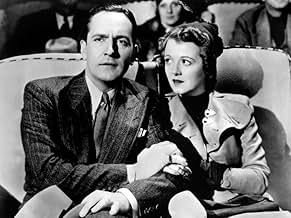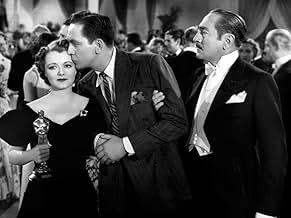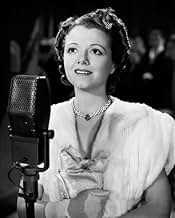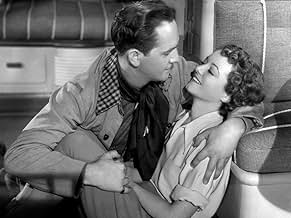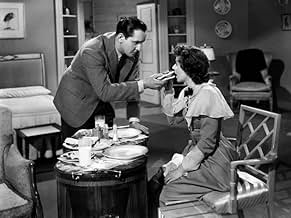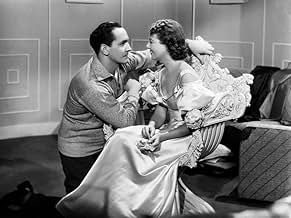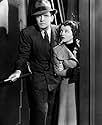VALUTAZIONE IMDb
7,3/10
11.498
LA TUA VALUTAZIONE
Una giovane donna arriva a Hollywood con sogni di celebrità, ma li raggiunge solo con l'aiuto di un noto attore, ora alcolizzato, il cui periodo di maggior fama è ormai alle sue spalle.Una giovane donna arriva a Hollywood con sogni di celebrità, ma li raggiunge solo con l'aiuto di un noto attore, ora alcolizzato, il cui periodo di maggior fama è ormai alle sue spalle.Una giovane donna arriva a Hollywood con sogni di celebrità, ma li raggiunge solo con l'aiuto di un noto attore, ora alcolizzato, il cui periodo di maggior fama è ormai alle sue spalle.
- Regia
- Sceneggiatura
- Star
- Vincitore di 1 Oscar
- 7 vittorie e 7 candidature totali
Guinn 'Big Boy' Williams
- Posture Coach
- (as Guinn Williams)
Jean Acker
- Woman at Preview
- (non citato nei titoli originali)
Eric Alden
- Niles' Assistant
- (non citato nei titoli originali)
Irving Bacon
- Station Agent
- (non citato nei titoli originali)
Jane Barnes
- Waitress #1
- (non citato nei titoli originali)
Vince Barnett
- Otto
- (non citato nei titoli originali)
Clara Blandick
- Aunt Mattie
- (non citato nei titoli originali)
Recensioni in evidenza
I believe this as one of the most beautiful pictures I have ever seen. I enjoyed the story, the dialog and above all I enjoyed the atmosphere and the actors. All of them are great but to me Fredric March is outstanding.
Norman/Alfred is a wonderful character: frail, undignified, touchy, weak and able to love Vicki/Esther so much, with all his heart.
Fredric March brings all of it on the screen, providing one of his best performances here.
If you would like to become an actor, I believe you should watch this movie and Mr. March's way of acting. Pay attention to his eyes, his hands, his face and his moves, especially when he interrupts his wife thanking everybody for the Oscar she got and claims he deserves three statues for the worse performances.
He is overcome by himself and starts dying. I just shivered.
To me, this version can't be compared to its remakes. The allure and the fascination of Hollywood have been perfectly represented here, together with an unpleasant and creepy feeling of emptiness.
Norman/Alfred is a wonderful character: frail, undignified, touchy, weak and able to love Vicki/Esther so much, with all his heart.
Fredric March brings all of it on the screen, providing one of his best performances here.
If you would like to become an actor, I believe you should watch this movie and Mr. March's way of acting. Pay attention to his eyes, his hands, his face and his moves, especially when he interrupts his wife thanking everybody for the Oscar she got and claims he deserves three statues for the worse performances.
He is overcome by himself and starts dying. I just shivered.
To me, this version can't be compared to its remakes. The allure and the fascination of Hollywood have been perfectly represented here, together with an unpleasant and creepy feeling of emptiness.
Fredric March gave a magnificent performance, probably the best of his career, as Norman Maine, the actor whose career is in the descendant as that of his wife, Vikki Lester, is in the ascendant in this, the first 'official' version of "A Star is Born", (the 1932 film "What Price Hollywood" roughly told the same story). March displays just the right degree of brashness, of knowingness, and a combination of ego and a real actor's almost complete lack of ego. It's a miraculous piece of work.
As Lester, Janet Gaynor is touchingly blank but the star quality she is meant to display seems conspicuously absent; (in the 1954 musical remake Judy Garland was almost too much a star). It seems inconceivable that she could eclipse March on screen (even with his drinking). If Lester is a star and possibly a great actress Gaynor keeps the secret to herself.
The script for this version was partly written by Dorothy Parker and Alan Campbell and it shows. It's an acerbic and, at times, savage movie about the movies, quite cynical for a major studio picture of it's day. It is very well directed by William Wellman who draws first-rate performances from the supporting cast, in particular Lionel Stander as a heartless, slime-ball studio hack. This remains the best of the three versions to come thus far.
As Lester, Janet Gaynor is touchingly blank but the star quality she is meant to display seems conspicuously absent; (in the 1954 musical remake Judy Garland was almost too much a star). It seems inconceivable that she could eclipse March on screen (even with his drinking). If Lester is a star and possibly a great actress Gaynor keeps the secret to herself.
The script for this version was partly written by Dorothy Parker and Alan Campbell and it shows. It's an acerbic and, at times, savage movie about the movies, quite cynical for a major studio picture of it's day. It is very well directed by William Wellman who draws first-rate performances from the supporting cast, in particular Lionel Stander as a heartless, slime-ball studio hack. This remains the best of the three versions to come thus far.
This early version of "A Star is Born" is well-performed by a good cast, and an interesting story. The basic idea is fairly simple, but filled with potential, and it is done skillfully.
Janet Gaynor and Frederic March work very well as a Hollywood couple whose careers are headed in different directions, with March's performance being especially good. The rest of the cast rounds out the picture nicely with good performances of their own. While the inside look at Hollywood is interesting in its own right, the heart of the story is the way that the couple's marriage and relationships are affected by her career taking off at the same time that his is crashing. It's the kind of story that only works with believable characters, careful writing, and convincing acting, and all of those are present here.
While overshadowed by the lavish 50's remake, this earlier version is still quite worthwhile in its own right.
Janet Gaynor and Frederic March work very well as a Hollywood couple whose careers are headed in different directions, with March's performance being especially good. The rest of the cast rounds out the picture nicely with good performances of their own. While the inside look at Hollywood is interesting in its own right, the heart of the story is the way that the couple's marriage and relationships are affected by her career taking off at the same time that his is crashing. It's the kind of story that only works with believable characters, careful writing, and convincing acting, and all of those are present here.
While overshadowed by the lavish 50's remake, this earlier version is still quite worthwhile in its own right.
A young country girl named Ester Blodgett (Janet Gaynor) arrives in Hollywood filled with dreams of becoming a famous movie starlet. However, she gets nowhere until she's noticed by famous movie star Norman Maine (Fredric March), a performer on his way down in terms of popular appeal. The two fall in love but just as Ester's star, under the stage name Vicki Lester begins to rise, Maine's begins to fade.
The best thing about this film is the performance given by Fredric March as actor Norman Maine. He nails the inner emotional turmoil going on inside his character and makes him always sympathetic to the viewer even as Maine falls in and out of sobriety. It's Maine's character that proves most interesting to the viewer here as March completely steals the film away from star Janet Gaynor.
Gaynor doesn't prove quite as appealing or convincing in her lead role as Ester Blodgett/Vicki Lester and honestly it's hard to see why the public should favor her so. Maybe this was to symbolize the fickleness of the public in that they should prefer a pretty new face over a talented older one. Who knows? Nevertheless Gaynor just doesn't ever prove as appealing here in her role as she should.
The best thing about this film is the performance given by Fredric March as actor Norman Maine. He nails the inner emotional turmoil going on inside his character and makes him always sympathetic to the viewer even as Maine falls in and out of sobriety. It's Maine's character that proves most interesting to the viewer here as March completely steals the film away from star Janet Gaynor.
Gaynor doesn't prove quite as appealing or convincing in her lead role as Ester Blodgett/Vicki Lester and honestly it's hard to see why the public should favor her so. Maybe this was to symbolize the fickleness of the public in that they should prefer a pretty new face over a talented older one. Who knows? Nevertheless Gaynor just doesn't ever prove as appealing here in her role as she should.
Janet Gaynor plays Esther Blodgett beautifully, a girl who leaves for Hollywood with dreams of film magazines and the blessing of her granny. Once there she finds it tough-going until meeting Norman Maine (Fredric March) at a party. We've already seen Norman drunk at a theatre but here he charms Esther and actually gets her into the movies before marrying her and watching his own career crumble. March is excellent in this, and the look of the film is surprisingly modern with its lovely technicolor and gadgets (I particularly like the shower in the motor home Esther and Norman take on honeymoon). Esther's move to become star Vicki Lester, Oscar-winning actress, is unbelievable but as her real-life tragedy unfolds, compelling. And who can stay dry-eyed at the end? Remade with music and Judy Garland in 1954 (very well) but this first version is a jewel amongst other 30s classics.
Lo sapevi?
- QuizThe first all-color film nominated for an Academy Award for Best Picture.
- BlooperThe Night Court Judge refers to the "commonwealth" of California, but California isn't one of the states with commonwealth status. The judge should have referred to the "state" instead.
- Citazioni
Grandmother Lettie: If you've got one drop of my blood in your veins, you won't let Mattie or any of her kind break your heart, you'll go right out there and break it yourself.
- Versioni alternativeAlso available in black and white
- ConnessioniEdited into What's Cookin' Doc? (1944)
- Colonne sonoreCalifornia, Here I Come
(1924) (uncredited)
Music by Joseph Meyer
(variations in the score as Esther arrives in Hollywood)
I più visti
Accedi per valutare e creare un elenco di titoli salvati per ottenere consigli personalizzati
Dettagli
- Data di uscita
- Paese di origine
- Lingua
- Celebre anche come
- Nace una estrella
- Luoghi delle riprese
- Aziende produttrici
- Vedi altri crediti dell’azienda su IMDbPro
Botteghino
- Budget
- 1.173.639 USD (previsto)
- Tempo di esecuzione1 ora 51 minuti
- Proporzioni
- 1.37 : 1
Contribuisci a questa pagina
Suggerisci una modifica o aggiungi i contenuti mancanti

Divario superiore
By what name was È nata una stella (1937) officially released in India in Hindi?
Rispondi

